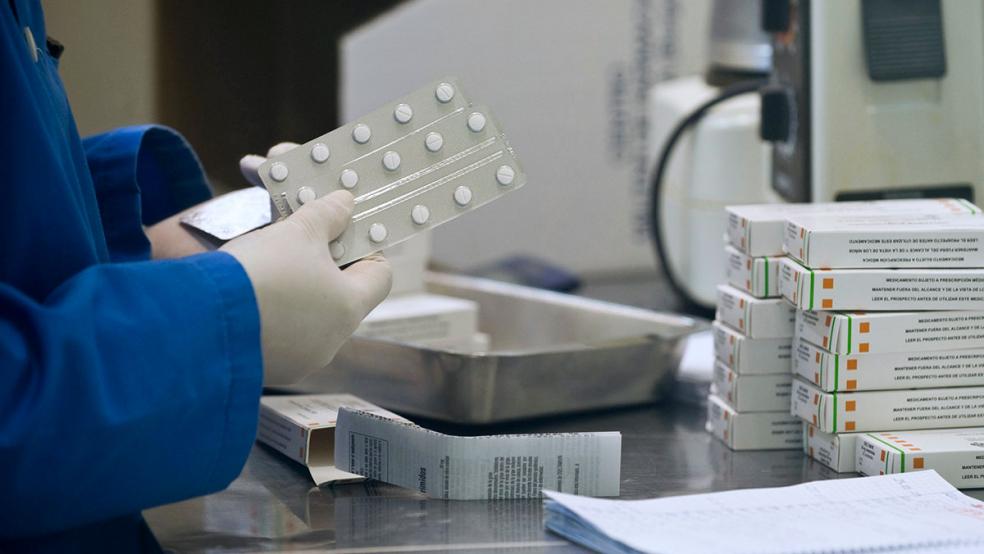Earlier this month, three Veterans Affairs Department employees in Little Rock, Arkansas, were indicted on federal charges of stealing prescription medications, including opioids, from a VA hospital and conspiring to distribute those drugs.
The three employees -- Satishkumar "Steve" Patel, 44, of North Little Rock, Alisha Pagan, 33, of Mabelvale, and Nikita Neal, 42, of Little Rock -- were arrested and charged with eight counts of illegally ordering oxycodone, hydrocodone, Viagra, Cialis and promethazine syrup with codeine and then diverting it for street distribution, according to the Justice Department.
Related: Trump’s Health Secretary Invested in a Company Linked to the Opioid Epidemic
As disturbing as case may be, it is just the tip of the iceberg.
The U.S. is struggling with a surge in opioid addiction and illegal prescription drug trafficking, and VA hospitals throughout the country have experienced a sharp increase in opioid theft, misplaced or stolen prescriptions and unauthorized drug use by VA employees, as the Associated Press reported on Monday.
Indeed, the number of reports of drug losses or thefts at federal hospitals increased from 272 in 2009 to 2,926 in 2015, before declining slightly to 2,457 last year, according to U.S. Drug Enforcement Administration data obtained by the AP. Most of those federal hospitals are VA facilities, along with correctional facility hospitals and health care centers for Native Americans.
Related: US Death Rate From Heroin and Opioid Abuse Soars
Making matters worse, some of the VA hospitals have been careless in tracking their drug supplies, despite warnings from government auditors dating back to 2009 to tighten security.
"Drug theft is an area of concern," Jeffrey Hughes, the VA's acting assistant inspector general for investigations, told the AP. He said an improvement in the monthly inspections could help the VA uncover potential discrepancies and root out crime.
In the Little Rock case, the inspector general’s office opened an investigation in June 2016 after receiving a report that large amounts of unaccounted for prescription medications were being charged to accounts at the VA’s John L. McClellan Memorial Veterans Hospital.
The investigation subsequently revealed that Patel, a pharmacy technician, used his VA access to a medical supplier’s web portal “to order and divert 4,000 oxycodone pills, 3,300 hydrocodone pills, 308 ounces of promethazine with codeine syrup, and more than 14,000 Viagra and Cialis pills,” at a cost to the VA of roughly $77,700 dollars and an estimated street value of more than $160,000, according to the Justice Department.
Related: The US War on Drugs in Afghanistan Is an $8 Billion Failure
Patel funneled the medications to Pagan, a pharmacy technician, who in turn distributed a portion of the drugs to Neal, a pharmacy technician trainee. All three defendants were charged with conspiring to steal the drugs and distribute oxycodone and hydrocodone, two of the most powerful, addictive and deadly drugs on the market.
The opioid addiction crisis that has swept the country became a major issue during the 2016 presidential campaign. The number of overdose deaths involving opioids increased from 28,647 in 2014 to 33,091 in 2015, an 8.9 percent rise, according to the National Center for Health Statistics. Between 2011 and 2013, there were 13.4 deaths from drug overdoses for every 100,000 people.
The reports of rampant drug theft and distribution at veterans’ hospitals marks another black eye for the embattled VA, which is still trying to fully recover from a 2014 scandal revealing flagrant efforts to deny veterans speedy medical care and assistance.
Related: 44% of Americans Say They Know Someone Addicted to Pain Killers
Former Proctor & Gamble CEO Robert McDonald was brought in by President Obama as the new VA secretary to help clean up the mess. President Trump recently replaced McDonald with David Shulkin, a physician who had served as VA undersecretary.





